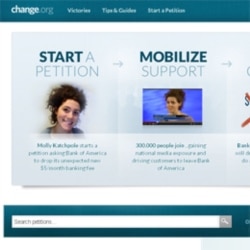Teachers: Download a version with English teaching activities for your classroom
This is the VOA Special English Technology Report.
The modern way to collect signatures on a petition requires no paper or pen or standing on a street for hours. All it requires is going online.
Change.org is a social action website where people around the world can start or sign online petitions. The top causes range from animal protection to criminal justice to women's rights.
There are many different reasons why people start petitions at the site. Lauren Todd of New York told CBS television that she started a petition a few months ago after she saw a picture of a girls shirt on Facebook. The shirt read: "I'm too pretty to do homework, so my brother has to do it for me."
LAUREN TODD: "It was outrageous enough to be posted on Facebook, but it was actually more outrageous than that, and I felt like I needed to do something about it."
Ms. Todd's petition urged shoppers to boycott J.C. Penney stores until they stopped selling shirts with what she called sexist messages.
Five hours later, Shelby Knox started tweeting about the petition to her thousands of Twitter followers. Ms. Knox is the director of women's rights organizing for Change.org. Some of her followers also started tweeting about the shirt and signing the petition.
SHELBY KNOX: "From the time that Lauren started the petition on Change.org and J.C. Penney pulled the shirt, it was about ten hours, in which it got over two thousand signatures and at one point was generating over four hundred tweets a minute."
Ms. Knox said that with each new signature, an e-mail automatically went to J.C. Penney's public relations team. Another went to the company's chief. J.C. Penney, without comment, discontinued the shirts.
Clothing designer John Noone has worked with a number of large stores. He says he has always used words like "pretty" or "princess" when he creates shirts for girls.
JOHN NOONE: "Because it's easy to do, I guess it's just so ingrained in our culture that just it's an easy sale. It's going to be easier to sell a shirt that says, you know, 'My little princess' than, uh, 'My A student.'"
Mr. Noone says fashion designers find their ideas in many places. It could be a celebrity's tweet or something said on a TV show.
JOHN NOONE: "And if you think it's funny and the designer thinks it's funny and the buyer thinks it's funny, then it, you know, it makes it to the store."
But now, with the Internet, consumers who take offense can do more than just write an angry letter to the company.
Another clothing seller, Forever 21, got in trouble not long after J.C. Penney. Forever 21 was selling a girl's shirt that read "Allergic to Algebra." It stopped selling them the day after the story spread.
Robin Sackin is a professor at New York's Fashion Institute of Technology. She thinks people should not get so angry. Children are influenced by their parents, she says, not the words on a shirt.
ROBIN SACKIN: "So if my child says to me 'Mommy, I want to get that,' I've said, 'OK, you can have it, but just remember something -- I don't care if you're pretty, you're doing your homework.'"
And that's the VOA Special English Technology Report. Have you ever started a petition -- online or on paper? Tell us your story at voaspecialenglish.com. I'm Mario Ritter.
___
Contributing: Ashley Milne-Tyte





